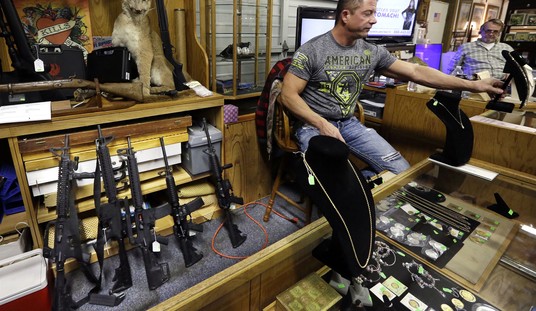It was eight years ago today. At once, it seems so long ago, and yet, it also feels like yesterday. That day was the day a dear friend of mine was gunned down by a maniac who was pissed that a coffee shop called Cafe Racer in Seattle wouldn’t serve him any longer.
Yet the aftermath of that horrible day made me think long and hard about not just my own views of guns, but also how gun controllers continue to gain ground in the aftermath of other horrible days.
You see, five people plus the killed died that day, but only one really resonates with me. Kimberly Lynn Layfield, age 36, was something you don’t see often. Drop-dead gorgeous and with a kind, generous soul who spent high school enjoying the company of the more geeky crowd than girls who looked like her normally did.
She was my friend. I’ve written about this before.
In the immediate aftermath, though, I started questioning my views of guns and gun control.
Now, bear in mind that even then, I tended to believe that the term “Constitutional gun control laws” was a contradiction in terms and I still do. Yet at that moment, I started wondering if I was wrong. It didn’t last long, mind you, just a matter of seconds, but it was still there.
That moment, that indecision, shook me. It shook me deeply. I wondered why I would even consider throwing away fundamental beliefs at a moment like that.
It made me come to understand a bit about how people change their minds.
Now, I’m not an expert by any means, but follow with me as I try to explain what I’m saying.
To start with, there are three ways you can persuade someone to do something. Aristotle labeled them:
- Ethos
- Logos
- Pathos
Ethos is the ethical argument. This is the argument where you try to persuade someone to do something because it’s the right thing or, conversely, to stop doing something because it’s wrong. This is the argument we often make with children because we’re trying to teach them ethics in the first place. However, as people get older, they develop their own sense of ethics and this argument becomes more difficult to use effectively.
After all, look at the people who try to appeal to your ethics to change your position on an issue you actually believe is the ethical position.
Logos is the logical argument. This is where you try to use logic to convince someone that something is the best course of action. This is a common approach to politics. After all, this is where the dueling statistical arguments tend to come from. By using facts to change someone’s opinion, we’re trying to get them to see it’s the correct course, even if they don’t feel it’s necessarily the ethical course, as they see it.
Sort of.
Seriously, this stuff is a bit more complicated, but I can’t write an entire book on the topic.
Finally, we have pathos. Pathos is the emotional argument. We all know these. We’ve seen them a thousand times. They’re the reason vegans try to anthropomorphize animals; it’s to get you to become to emotionally invested in them to actually eat them. However, it’s also arguably the most effective method of persuasion.
Our emotions evolved as part of a survival mechanism. We feel love for our children because it benefits the human species to feel love. Fear serves as a warning that we’re facing danger. Things like that.
As such, we’re hardwired for the emotional argument. Sure, we can look beyond it, but we have to want to look beyond it. We have to actively work to exist beyond those emotions.
It was my emotional response to Kim’s murder that made me take pause and reevaluate gun control for a moment. I’d heard the arguments countless times, but at that point, my emotions made me more susceptible to the argument than I was otherwise.
That’s why in the aftermath of horrible mass shootings–particularly school shootings like Parkland–we see such a swing in support for gun control. The media facilitates a platform for anti-gunners to shout from the rooftops. People are distraught, emotional, and their arguments play to those emotions. Because of those emotions, people begin to question. They’re open to solutions they might not otherwise even consider.
Over time, some people come back to recognizing the problems they saw before, but not everyone does. Ever mass shooting, every incident, further creates more people who support gun control.
But, knowing this, we can then use it to our advantage.
We need to craft emotional messages of our own. We need to highlight the terror someone felt when faced with an armed attacker. We need to talk about the relief a mother felt when she pulled the trigger on a burglar threatening her children. We need to highlight the relief felt by those protected by an armed citizen.
Some don’t like emotional messages. They argue that emotion is a crappy way to make a decision, and they’re not wrong. However, by failing to use this, we’re running a race with only one leg by choice. We can continue ignoring the fact that emotional arguments have led to anti-gunners gaining ground recently and end up with all the worst forms of gun control imaginable, or we can accept the fact that no everyone thinks like we do or has the wherewithal to look past those emotions and cater to them.
It’s not a difficult decision for me.
So today, I’m going to remember my friend. I’m going to think about her, but I’m also going to think about how she might still be here if just one single armed citizen with the will to act had been there. In fact, Kim might still be alive if that had been the case.








